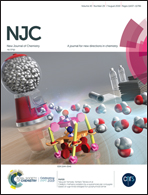Telopeptide-dependent xenogeneic collagen co-assembly†
Abstract
Xenogeneic collagen co-assembly (XCCA) is a novel and efficient strategy for improving and regulating the performance of collagen assembled products. However, the effect of collagen molecular structures on XCCA has long been neglected and remains unclear. Herein, we investigated the telopeptide effect of collagen on XCCA by employing grass carp skin collagen (GCSC) with two different structures (tropocollagen and atelocollagen) and porcine skin collagen (PSC). Kinetic analysis showed that the co-assembly rate of PSC and grass carp skin atelocollagen (AC-GCSC) was faster than that of PSC and grass carp skin tropocollagen (TC-GCSC). Based on this observation, we further obtained different concentration dependences of XCCA by the alteration of telopeptide. Compared with PSC/TC-GCSC co-assembly, PSC/AC-GCSC co-assembly exhibited a higher sensitivity and a lower detection limit. Furthermore, telopeptide promoted the fabrication of thicker fibrils and improved the mobility of gels.



 Please wait while we load your content...
Please wait while we load your content...